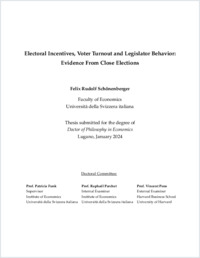Electoral incentives, voter turnout and legislator behavior : evidence from close elections
- Schönenberger, Felix Rudolf
- Funk, Patricia (Degree supervisor)
- 2024
PhD: Università della Svizzera italiana
Elections
Voter turnout
Polls
Legislator behavior
Political competition
Accountability
Candidate positions
Polarization
English
Close elections stand out due to their potential to influence political outcomes significantly. As expectedly tight races heighten the stakes, close elections alter the incentive structure for both voters and elected officials in a way that shapes public policy. For each individual voter, expectedly close elections may raise the perceived probability of casting the pivotal vote, and therefore increase their propensity to turn out. If expected election closeness asymmetrically affects the turnout of different groups of voters, close elections may alter the composition of the electorate, shaping election outcomes and ultimately public policy. For elected representatives, closely contested elections elevate the risk of losing office, intensifying incentives to implement policy in line with voter preferences, or to strategically adjust policy to positions taken by challenger candidates. This dissertation elaborates on, and tests these hypotheses using novel identification strategies and rigorous econometric methods for causal inference.
- Collections
- Language
-
- English
- Classification
- Economics
- License
-
License undefined
- Open access status
- green
- Identifiers
-
- NDP-USI 2024ECO002
- ARK ark:/12658/srd1327834
- URN urn:nbn:ch:rero-006-121852
- Persistent URL
- https://n2t.net/ark:/12658/srd1327834
Statistics
Document views: 255
File downloads:
- 2024ECO002: 485
